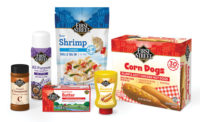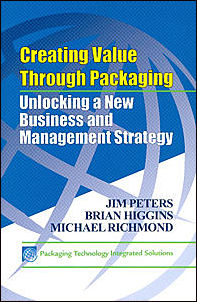Maturing Tactics Give Private Label a Cachet
![]()
Maturing Tactics Give Private Label a Cachet
No longer just the 'cheap alternative,' retailer brands are signaling quality. Marketers can gain an edge by supporting retailers' strategies.
By Toni Antonetti
If you dismiss retailer brands collectively as low-end knock-offs of national brands, you're missing significant opportunities for growth as private label matures as a marketing strategy. You even may be dooming the potential for working with some retailers.
Many retailers are realizing they can't always win the battle for lowest price. They're doing an "end-around" by evolving private label as in integral component of their marketing strategy to:
- Make their stores a destination.
- Market the store as the brand.
- Signal premium value.
"There has been a major transition in private-label products," says Debbie Millman, Managing Partner and President at The Sterling Group, New York. She observes that store brands "have evolved from cheap versions of name-brand items to products with a premium look. For consumers, it has created quite a dramatic shift in perception."
Consumers have always applied the term "value" to store brands. But now they're beginning to associate another buzzword: "quality."
Other factors driving the trend
Dynamics other than simply offering a quality product at the lowest possible price are at work here. Prevailing thinking is that America is "over-stored," so retailers need clear differentiation in their products to draw consumers through the front door.
This is giving rise to bold private-label marketing initiatives in distribution channels from warehouse clubs like Costco Wholesale Corp. to specialty grocers such as Trader Joe's.
But consider, too, one perspective of retailing powerhouses such as Wal-Mart and Target. They compete for lowest price on many everyday items. This past holiday season, for example, they slugged it out in a toy price war that has left some specialty toy retailers fighting for survival.
Wal-Mart and Target both sacrificed margins on toys to lure shoppers into their stores, expecting they would buy other products—at much higher margins—while in the store.
They are relying heavily on their private-label programs to help compensate for lost margins on toys, with good reason: One estimate places private-label margins at least 27 percent higher than those for national brands.
For the next generation of private-label products to flourish in this environment, a packaging strategy that defaults to "me-too" mode won't work, say a number of experts who track store brands.
Often, the package is the only difference between the national brands and the private-label products that retailers offer—and both are frequently filled on the same packaging line.
Clearly, private label as a branding and packaging strategy has a lot of room to mature—if you understand individual retailer strategies and offer the private-label brands that are exclusive to a particular retailer and that support its strategy.
Make the store a destination
Where offering the lowest price isn't always possible, some retailers are beginning to pursue private label as a tactic that transforms their stores into a destination.
Want your brand in on the ground floor? Marketers should view this emerging trend as an opportunity to build key alliances with retailers, says Jeff Wolfson, Principal at Pinpoint Consulting, New Rochelle, N.Y.
Wolfson points to Costco as a leader in this approach. Costco is building entire categories around a hybrid approach that focuses on its Kirkland Signature brand to create exclusivity in the warehouse club channel.
Tim Rose, Senior Vice President of Food, Sundries and Fresh Food, describes Costco's private-label objective: Provide products under the Kirkland Signature brand that are "as good as, or better than, the national brand, and at a savings of at least 20 percent."
Costco reasons that if consumers want Kirkland Signature, they have to visit Costco to purchase those products.
Rose adds that Costco becomes more receptive to stocking your national brand if you also package a similar product under the Kirkland Signature brand at a lower price.
It's a win-win-win proposition. The national brand gets its product into Costco stores. Costco gets its higher-margin, store-brand product placed next to the national brand. And consumers get more choices.
There's another plus in this approach for Costco. It builds legitimacy for Kirkland Signature across more categories. The brand accounts for 12 percent of the 4,000 SKUs in a typical Costco store.
Rose recommends that marketers visit a Costco store to observe how this tactic works in specific categories. In particular, check out the snack aisle.
Here's another aspect to Costco's strategy for store brands. Marketers can get an "in" by co-branding with its Kirkland Signature brand.
Packaging combinations such as Kirkland Signature/Starbucks in coffee, Kirkland Signature/Tyson in chicken and Kirkland Signature/Hanes in underwear are evident on its store shelves.
"In the case of Tyson chicken, we wanted to step up the quality of the frozen boneless, skinless chicken breasts that are a $100 million business for us annually," Rose explains.
This approach holds two marketing plusses. For Costco, co-branding continues to build the credibility of the Kirkland Signature brand. The marketer of a national brand recognizes that the store brand signals quality and they want to align their own brand with it.
Market the store as the brand
A second way that private label is evolving is by marketing a store as a brand. Trader Joe's offers an example. The 214-store specialty grocery chain targets the "overeducated and underpaid" consumer who likes high-quality, good-tasting treats and everyday products.
At Trader Joe's, a typical store features 2,500 retailer brand products—about 80 percent of the product mix—in an eclectic environment.
"We want to bring our customers the best products at a price that is reasonable," notes Pat St. John, Vice President of Marketing. "For our peanut butter, for example, we worked with a peanut company to develop a product with non-hydrogenated oils."
The company's market positioning revolves around an "environmentally friendly" policy that extends from its packaging to the range of its collateral materials. St. John says these include the use of recycled paper and soy-based inks.
Other lures inside the store are a stable of store-brand products with no preservatives, artificial coloring and flavoring, or MSG. Trader Joe's markets many of them as organic.
The grocer introduces about 20 new products each week, and in-store customer sampling is encouraged.
The packaging plays on the company's eco-friendly policy.
Premium value
Many retailers are now marketing a message of "premium" value in their private-label products.
A marketing program needs two components to achieve success with this tactic: A truly good product and packaging that reflects the quality that awaits inside.
Target executes this strategy while extending its "cheap-chic" marketing approach into food and beverage through a premium line of products marketed under the Archer Farms brand in its Super Target stores. These appeal to consumers who desire products that rival the national brands in taste and price point.
Bruce Tominello is President of Total Tabletop Consulting Inc. He helped develop the Archer Farms line during his 26 years in Target Stores' Food Division.
He explains that sharp packaging graphics and mouth-watering
photography enable consumers to "taste the difference" in Archer Farms' food products. BP
photography enable consumers to "taste the difference" in Archer Farms' food products. BP
The author, Toni Antonetti, is a freelance writer in Mundelein, Ill., whose background includes writing on packaging and branding issues.
The quality message WORKS
Private-label products account for 16 percent of all product sales in the United States, second only to Europe, at 22 percent.
Store brands are penetrating deeper inside U.S. stores, in part as marketers apply a more premium tag to them. Private label has moved into 88 new
product categories, according to a 2003 study by ACNielson.
product categories, according to a 2003 study by ACNielson.
Here's the breakdown in the two fastest-growing private-label categories: In drinkable yogurt, private label's sales grew 38 percent, compared with 17 percent for national brands. In sports energy drinks, growth was 33 percent for private label and 9 percent for national brands.
Newer private-label categories posting strong growth include lipstick and lip gloss, both up 26 percent, and facial cleansing products, up 21 percent.
In baby food, private label is growing by 20 percent, compared with a 2 percent increase for national-brand products.
Consumer confidence in private label products has increased, says Jane Perrin, ACNielsen Managing Director of Global Services.
"In areas like beauty products and baby food, trust is a vital element to success," Perrin notes. "Private label's growth in these areas shows that retailers are marketing effectively to consumers beyond the simple 'low-cost, high-volume' approach of the past."
A wake-up call for national brands
As store brands take deeper root across retail distribution channels, a veteran industry analyst sounds a warning for national brands.
To maintain market share in your category, you need to establish a deeper relationship with your consumers.
If the brand message is murky and unsupported at every "touchpoint," you risk consumers switching to another brand. Increasingly, the option of choice
is a store brand.
is a store brand.
Adds Debbie Millman at The Sterling Group: "To keep consumers brand loyal will mean developing better, more
creative products.
creative products.
"It may also mean repackaging products and use of more promotional tactics."
Bruce Tominello at Tabletop Consulting agrees: "I believe it's a wake-up call to the national brands. They need to take
the products to the next level through innovations in products, packaging
and presentation."
the products to the next level through innovations in products, packaging
and presentation."
Where to go for more information...
Strategic consulting services. At
The Sterling Group, contact Debbie Millman at 212.329.4609 or
contactus@sterlingbrands.com
The Sterling Group, contact Debbie Millman at 212.329.4609 or
contactus@sterlingbrands.com
Consulting services. At Pinpoint Consulting, contact Jeff Wolfson at 914.282.2684.
Looking for a reprint of this article?
From high-res PDFs to custom plaques, order your copy today!






